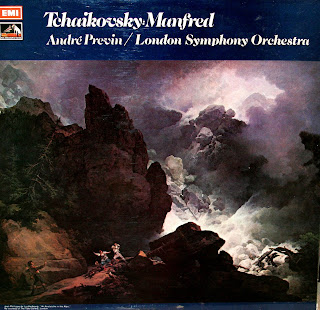Dog Fight: ASD 3018 Tchaikovsky Manfred Symphony, LSO, Previn
ASD 3018 vs. Alto Reissue, Tchaikovsky Manfred Symphony
LSO, Previn
Performance: 3.5/5
Sound: 4/5
$10 Black & White Postage Stamp (Ring), $30 Alto
Dog Fight Pressing Comparison Series
Listen to CD Version 2nd and 3rd movements:
2nd 3rd
Performance:
Well one Amazon reviewer summed up Previn's performance; a bit lackluster. I concur.
 {Lord Byron published his dramatic poem Manfred in 1817, and since then several composers including Robert Schumann in 1849 and Peter Tchaikovsky in 1885 have set it to music. The poem is typical of the extravagant Romanticism of the young Byron, all about a tortured hero bedeviled by guilt over a mysterious affair with his half-sister Astarte, fleeing into the surrounding Alpine countryside, calling upon supernatural forces to free him of his pain, and then, tormented, rejected, downcast, and unable to forgive or forget but defiant to the end, finally dying unredeemed. How's that for melodrama?
{Lord Byron published his dramatic poem Manfred in 1817, and since then several composers including Robert Schumann in 1849 and Peter Tchaikovsky in 1885 have set it to music. The poem is typical of the extravagant Romanticism of the young Byron, all about a tortured hero bedeviled by guilt over a mysterious affair with his half-sister Astarte, fleeing into the surrounding Alpine countryside, calling upon supernatural forces to free him of his pain, and then, tormented, rejected, downcast, and unable to forgive or forget but defiant to the end, finally dying unredeemed. How's that for melodrama?In the case of Tchaikovsky, he was reluctant at first to set it to music. He felt Schumann had already done it well enough, and there was nothing more he could add. Besides, he was not too keen on doing any more programmatic music, music that told a story or described a scene, despite the success of his Romeo and Juliet and Tempest overtures and Swan Lake ballet some years earlier. Go figure. Still, at the urging of friends and after a visit to the Alpine regions where Byron laid out the story, he proceeded, anyway. When he completed the Manfred Symphony, he hailed it as one of his best works. Then, after its lukewarm public and critical reception, he practically disowned it, saying only the first movement was any good. An artist's temperamental disposition, maybe, or just a reaction to apparent disapproval? Fortunately, the work survived (as did Tchaikovsky's interest in literary subjects, his doing a Hamlet overture a couple of years later as well as the Sleeping Beauty and Nutcracker ballets).} from right here on blogspot: http://classicalcandor.blogspot.com/2010/06/tchaikovsky-manfred-symphony-sacd.html
Sound:
The fourth movement is the powerhouse and gets a full side on the German Alto reissue, with the 2nd and 3rd movements on side 2 of this 3 side reissue (the fourth side is blank). Mr. Salvatore refers to these three sided Alto's as stupendous and they do make his Basic list. Perhaps with the right system the Alto's can deliver some memorable dynamics, but to my ears they fall short versus the original ASD Ring pressing. While the Alto offers a little more oomph in the lows, the Ring does well in this regard. The Ring is able to integrate the bass with the hall sound to a much greater degree than the Alto. The Alto also suffers from a dryness in the strings that firmly relegates it into second place. The original Ring pressing just does a better job of integrating everything with a better more layered soundstage and a more sublime sound. The Ring also appears to achieve a slightly lower noise floor.
The later EMI releases all have issues with delivering truly dynamic bass featuring a tight, constrained bass presentation. I suspect much of the issue is in the tape recordings themselves. One can get stupendous bass from these same later pressings when they are a reissue of the golden age EMI recordings or those from the mid-sixties.
The other area where the later pressings fall down is the midrange. With the strings, there just is not enough rosin on the bow so to speak. I suspect this is due to the introduction of integrated circuits into the recording chain in place of discrete transistors. The more complex signal path in these designs just appears to bleach the colors out of the midrange. The impact is not as bad with the reissues of earlier material on these labels. The Ring pressing may have the best midrange of the later labels, but it does not have as good a noise floor.
The Ring does rate a 4 for sound overall despite these deficiencies. Be sure to listen to the fourth movement as it is the sonic powerhouse on this LP. Later EMI pressings may be a possibility for this record, but I suspect their benefits will not outweigh the further loss of what midrange is on the original tapes.






Can't say that there have been many golden age recordings of the Manfred period. Here is one which I see:
ReplyDeletePhilips Hi-Fi Stereo SAL 3491: Markevitch conducting the LSO
I haven't heard it, though I wonder if you might get better midrange and bass from this recording. It's Dutch Philips, not a US Columbia reissue, so there's potential.
I think Muti EMI and Maazel Decca are good ones. Maazel might have better sound and I may have it. Muti I've not looked into.
DeleteThere is an EMI ASD recording with Silvestri. I have the mono-ALP and will look it up. I have the Markevitch and Maazel too, but, when it comes to Manfred I usually reach for the Previn.
Deletehttp://milestomozart.blogspot.com/2013/07/a-boxed-set-to-own.html For cheapskates this is a great way to check out silvesteri before springing for any pricey LPS. Even Aqlam Appears to have stumbled on putting up a cover with the number and price range For the Manfred.
DeleteI have to correct myself. There is no ASD equivalent of the Silvestri Manfred recording (ALP 1668). There is no stereo release on vinyl at all though it was recorded in 1959, in stereo. It appears that this CD box contains the first stereo release of the recording!
DeleteYou might want to check out the Goosens/London SO on Everest SDBR 3035. Doesn't have quite the low end oomph that the EMI does, but it's a very immediate and dynamic recording. The performance is a very good one.
ReplyDeleteWow fanatic I missed this post in the excitement on the HAITINK. I look for this.
DeleteMove mountains to find Haitink's (yes, Haitink's) stormy (yes, stormy) incredibly dynamic and well-recorded performance on Philips from 1980 (yes, Philips). Haitink must have been off his quaaludes that day, because he whips up more of a frenzy than even Muti in Tchaikovsky's amazing, if meandering symphony. I obsess over the Manfred and no one comes close to Haitink. Sample just the coda of the first mov't if you don't believe me. Turn it up and watch the drywall crack. And while I'm at it, Haitink and the Concertgebow's horn soloist turn in the most luminous slow mov't of Tchaikovsky's 5th that I know (in this case, there are hundreds of recordings and I've not heard them all).
ReplyDeleteThanks again, John, for the comment. I've heard good things about the Haitink Tchaikovsky cycle on Philips though have to admit that I haven't heard it (came very close to picking up select symphonies on LP on Ebay but didn't pull the trigger). I do like Muti on EMI and Markevitch on Philips. Based on your recommendation, though, I might just need to get a hold of the Haitink! Do you have the single LPs or the boxed set?
DeleteWow. I am digging through my 10,000 LP collection to see if I have either of these. Philips is kind of the Undiscovered Country for me and many audiophiles. Mercury Golden Imports pressed by Philips are well respected and my colleague has had some very interesting reviews. I myself have a Philips Haitink recommended in the Supreme Recordings of Debussy Images for Orchestra. Anything close to that sound quality with a great performance would be amazing. I'm looking, hopefully not shopping....
DeleteLooking through my 10,000 LP collection
DeleteWell the Haitink Tchaikovsky Fifth seems well liked and I see a UK pressing on ebay. Is that preferable to a dutch or us pressing? I see Manfred's but they are in the UK and so have higher shipping costs.
DeleteTY aqlam and Meles for reading. I have the single Lp Manfred. I imprinted on Muti's but Haitink lets the violent coda (of the 1st mov't) breath a little more. In the end, there aren't too many Philips which have wowed me as recordings, but the above plus Haitink's Bartok Music for Strings/Perc/Celesta always put a smile on my face. I tried Haitink's Tchaikovsky 2nd/4th/6th but sadly we're back to the usual stiff-lipped interpretations here, and Philips' sound seemed a little diffuse.
DeleteJust in today. My UK HAITINK Tchaik 5 awesome sound and performance. Great job John!
DeleteWhew! Glad to hear it. How 'bout that horn solo in the 2nd mov't, bathed in the Concergebouw acoustic? Gorgeous, isn't it? And the heavy strings which introduce? I have a friend who has attended recording sessions in that hall, and he said that they hang a very heavy curtain about halfway into the empty audience section to damp things a bit.
DeleteYes, got to listen again as I was less enchanted with side 2. Side 1 was awesome all the way through and you are dead on right about the horn. I've got audiophile Sheffield lab moscow sessions of piece to shoot out with it. I like my English pressings and dicussed briefly with Tin Ear in our Living Decca SXL Blueback Guide post. Will listen to side 2 again soon and compare.
DeleteAre you the Dr. John Daniel of multiple Benz LPS fame (saw a post somewhere else)? Very interested in that cartridge, but just heard from local audiophile who got one and with any luck I'll get to hear it in the next month.